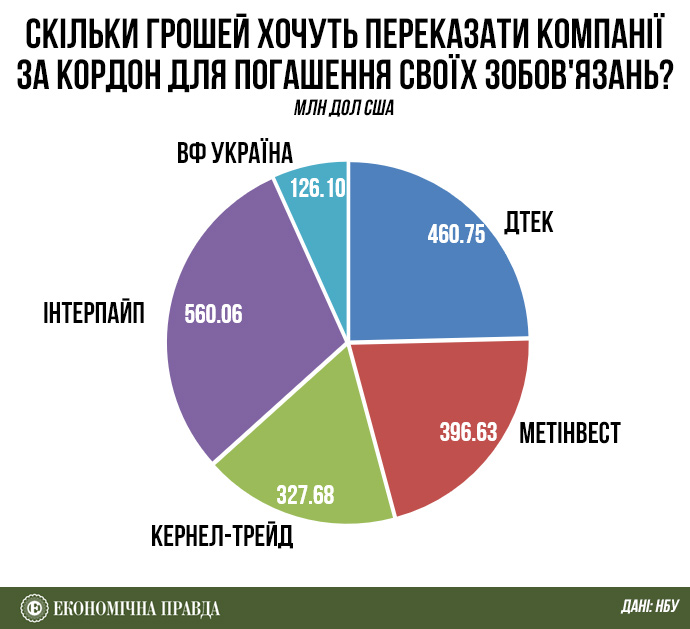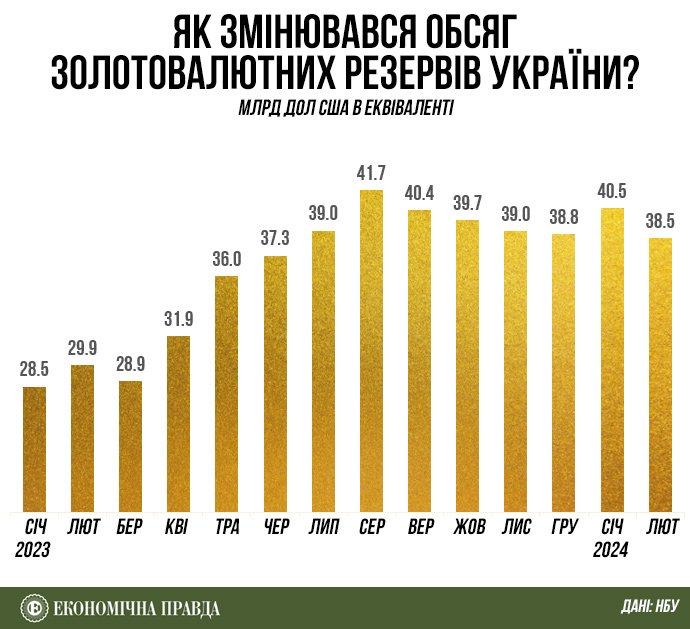Big business asks to cancel currency restrictions for it
Despite the NBU's ban, government officials allowed large businessmen to pay off billions of dollars in foreign debts, Ekonomichna Pravda reports. Neither international partners nor the National Bank appreciated the consequences of this decision.
In the first hours after the start of the great war, the National Bank introduced a series of extremely strict currency restrictions. The reason is clear: to preserve international reserves and financial stability in the face of absolute uncertainty and panic among citizens and businesses.
Most of the currency restrictions remain in place more than two years after the first Russian missiles hit Ukrainian cities. In particular, private businesses are still prohibited from transferring foreign currency abroad, even if it is to repay foreign debts and even if they are debts of large companies.
However, large businesses are trying to get an exception to the currency restrictions to service their foreign loans and Eurobonds. It seems to be succeeding. In early February, the government adopted a series of decisions that allow almost $2 billion to be transferred abroad to service the debts of five large groups of companies, bypassing currency restrictions: "DTEK, Metinvest, Kernel, Interpipe and Vodafone.
The National Bank is obliged to implement the government's decision, but it is in no hurry.
What happened
Inlate November 2023, the Verkhovna Rada passed a law limiting the maximum interest rate on microloans to one percent per day. Prior to that, on average, microfinance companies (MFIs) charged their borrowers 2.5% and sometimes 5% per day.
The National Bank, which regulates the MFI market, actively advocated the adoption of this law. However, the text of the final decision of the parliament contained one unpleasant surprise for the NBU, which concerned not micro- but macro-loans.
An amendment by MP Borys Prykhodko (Dovira group) gave the government the right to exempt certain companies from currency restrictions imposed by the National Bank during martial law.
To do this, the Cabinet of Ministers must approve a petition to the NBU requesting permission to transfer currency abroad by a particular company. The central bank considers such a request and fulfills it. The regulator cannot refuse the government.
In early February, a number of companies tested the new law in action. They convinced the Cabinet of Ministers to approve 15 requests to the NBU to transfer more than $1.8 billion. The government's requests concerned companies of five large groups: "DTEK and Metinvest of Rinat Akhmetov, Kernel of Andriy Verevsky, Interpipe of Victor Pinchuk, and Vodafone of Azerbaijan's Nexol Holding.
Earlier, the Cabinet of Ministers had already applied to the regulator for permission to transfer currency, but it was about much smaller amounts. According to the National Bank, in 2022-2023, it issued nine permits to transfer funds abroad for a total amount equivalent to $67 million (one decision for $29 million and eight decisions for $38 million).
This time, the government's requests are for an amount equivalent to 5% of foreign exchange reserves. The regulator is obliged to fulfill this request in a situation where the economy has received almost no external financing for two months.
Why companies need an exception to currency restrictions
Before the Great War, companies actively entered international capital markets. At times, their credit ratings were even higher than those of their sovereign, i.e. Ukraine, which is outside the rules of rating agencies.
Unlike the Ukrainian market, it is much more profitable to borrow in foreign currency in the EU. It was especially cheap in the run-up to 2022, when the world was experiencing a period of record low interest rates. Servicing these debts was not a problem, as such borrowers are export-oriented and receive most of their revenue in foreign currency.
However, on February 24, 2022, the National Bank issued aresolution prohibiting businesses from transferring foreign currency out of Ukraine. This decision could have led to defaults for companies that raised funds abroad. However, they found ways to continue paying their debts.
"In the two years since the start of the full-scale invasion of Ukraine, Metinvest has used more than $500 million of its own working capital to service its Eurobonds. This was made possible primarily by the working capital of the group's parent and international trading companies," Metinvest explained to the EP.
The fact that large Ukrainian businesses did not return foreign currency earnings from exports to the country helped to partially service foreign currency debts. In addition, a source at the National Bank told the EP, some companies resorted to manipulation by making fictitious imports to transfer currency abroad.
Be that as it may, some businesses are running out of opportunities to pay on their Eurobonds. At least, they say so publicly.
"Since February 2022, Interpipe has taken all possible measures to ensure stable financial operations and settlements with creditors, but has exhausted internal reserves to service its loan obligations and is on the verge of default due to restrictions imposed by the NBU (if it has sufficient own financial resources and own currency)," Interpipe said, asking the NBU for permission to transfer more than half a billion dollars.
Large companies note that a positive decision by the National Bank will help avoid default, preserve Ukraine's investment attractiveness, and even attract investment.
"Fulfillment of financial obligations to foreign banks is what business can and must do in the face of military realities to support the economy and Ukraine's positive investment reputation," Kernel said.
Although the solvency of large taxpayers employing thousands of Ukrainians is at stake, not everyone supports allowing them to transfer currency abroad. The regulator itself is against such a decision.
Arguments against
The National Bank is actively moving towards currency liberalization. From time to time,it amends the above-mentioned resolution, for example, allowing individuals tobuy non-cash currency or service external obligations to international financial organizations.
At the same time, he opposes individual decisions that are not made for all market participants.
"The NBU remains committed to a comprehensive approach to easing restrictions in line with the strategy (of easing currency restrictions - EP). This is due to the fact that the country's foreign exchange resources are limited, especially given the disruption of the rhythm of international financing. Granting individual permits to individual companies will require the appropriate use of the country's limited resources," the NBU explained to EW.
Indeed, due to the decrease in the flow of international aid to the Ukrainian budget, the volume of international reserves is gradually decreasing. This has been going on continuously since August 2023.
Sufficient reserves allow the NBU to feel more confident and maintain a stable hryvnia exchange rate, which has been allowed to fluctuate in a controlled manner since October 2023.
In return, companies that have contacted the NBU say that they do not need to buy foreign currency to transfer it abroad. They have this currency on their accounts with Ukrainian banks, so its transfer will not affect the amount of international reserves.
Another concern of the regulator is that granting separate permits for currency transfers abroad distorts the competitive environment and demotivates businesses that have not received such permits.
According to the NBU, more than 3,000 companies are waiting for permits to service their external liabilities. Not all of them have their own currency to pay their creditors. If all of them try to use government requests to repay their debts, they may not have enough reserves, which will negatively affect exchange rate stability.
In addition to the National Bank, international partners opposed granting permits to large Ukrainian companies. EP has learned about the contents of a letter sent by Gavin Gray, head of the IMF mission to Ukraine, to the authorities. In it, he "strongly urges" the Cabinet of Ministers to withdraw the petition to the NBU regarding the five companies. The IMF also recommends changing the legislation so that the practice of using the government's petitions to circumvent currency restrictions is not repeated.
In its appeal, the IMF cites the following arguments.
1. Granting individual permits contradicts the overall strategy of currency easing developed by the NBU and agreed by the IMF.
2. Approval of large cross-border transfers by private businesses could weaken foreign exchange reserves, and their reduction could undermine the stability of the foreign exchange market.
3. Granting privileged permission to service external debts to a limited number of companies threatens negotiations on restructuring Ukraine's Eurobonds.
The last point will affect the restructuring negotiations rather indirectly. "Holders of government Eurobonds may ask why Ukraine refuses to pay on its sovereign debt if it issues foreign currency for commercial repayments," says ICU Group financial analyst Mykhailo Demkiv.
In other words, Ukraine's creditors may get an additional argument in the negotiations on the restructuring of the $22.7 billion debt, which Ukraine needs to complete by the summer of 2024.
What happens next
Currently, five large business groups are still waiting for the National Bank to issue individual permits for currency transfers. Although the NBU is required by law to grant them, the same law does not specify when this should happen.
"The NBU has taken into account the government's proposals set out in the relevant petitions and reiterates that currency restrictions are not a market practice, but a forced consequence of a full-scale war. It is the war that remains the key deterrent to investment in Ukraine, not currency restrictions," the regulator said.
Off the record, EP's interlocutors at the National Bank hint that the companies that the government has requested can only get permission to bypass currency restrictions after these restrictions are lifted for all.
Until then, big businesses will have to figure out ways to service their debts without transferring currency out of Ukraine. After all, they somehow managed to do so for the past two years.
Yaroslav Vinokurov
Buhgalter 911 notes that the content of the author's materials may not coincide with the policy and opinion of the editorial team. The authors of the published materials include not only representatives of the editorial team.
The information presented in a particular publication reflects the position of the author. The editorial team does not interfere with the author's materials, does not edit the texts, and is therefore not responsible for their content.

